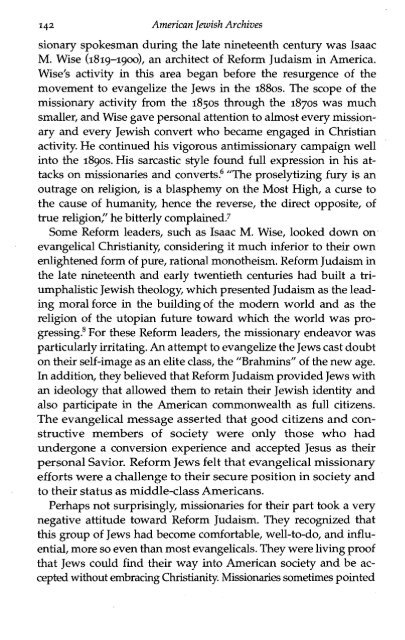Create successful ePaper yourself
Turn your PDF publications into a flip-book with our unique Google optimized e-Paper software.
142 <strong>American</strong> <strong>Jewish</strong> <strong>Archives</strong><br />
sionary spokesman during the late nineteenth century was Isaac<br />
M. Wise (1819- goo), an architect of Reform Judaism in America.<br />
Wise's activity in this area began before the resurgence of the<br />
movement to evangelize the Jews in the 1880s. The scope of the<br />
missionary activity from the 1850s through the 1870s was much<br />
smaller, and Wise gave personal attention to almost every mission-<br />
ary and every <strong>Jewish</strong> convert who became engaged in Christian<br />
activity. He continued his vigorous antimissionary campaign well<br />
into the 1890s. His sarcastic style found full expression in his at-<br />
tacks on missionaries and converts! "The proselytizing fury is an<br />
outrage on religion, is a blasphemy on the Most High, a curse to<br />
the cause of humanity, hence the reverse, the direct opposite, of<br />
true religion: he bitterly complained?<br />
Some Reform leaders, such as Isaac M. Wise, looked down on<br />
evangelical Christianity, considering it much inferior to their own<br />
enlightened form of pure, rational monotheism. Reform Judaism in<br />
the late nineteenth and early twentieth centuries had built a tri-<br />
umphalistic <strong>Jewish</strong> theology, which presented Judaism as the lead-<br />
ing moral force in the building of the modern world and as the<br />
religion of the utopian future toward which the world was pro-<br />
gressing? For these Reform leaders, the missionary endeavor was<br />
particularly irritating. An attempt to evangelize the Jews cast doubt<br />
on their self-image as an elite class, the "Brahmins" of the new age.<br />
In addition, they believed that Reform Judaism provided Jews with<br />
an ideology that allowed them to retain their <strong>Jewish</strong> identity and<br />
also participate in the <strong>American</strong> commonwealth as full citizens.<br />
The evangelical message asserted that good citizens and con-<br />
structive members of society were only those who had<br />
undergone a conversion experience and accepted Jesus as their<br />
personal Savior. Reform Jews felt that evangelical missionary<br />
efforts were a challenge to their secure position in society and<br />
to their status as middle-class <strong>American</strong>s.<br />
Perhaps not surprisingly, missionaries for their part took a very<br />
negative attitude toward Reform Judaism. They recognized that<br />
this group of Jews had become comfortable, well-to-do, and influ-<br />
ential, more so even than most evangelicals. They were living proof<br />
that Jews could find their way into <strong>American</strong> society and be ac-<br />
cepted without embracing Christianity. Missionaries sometimes pointed

















